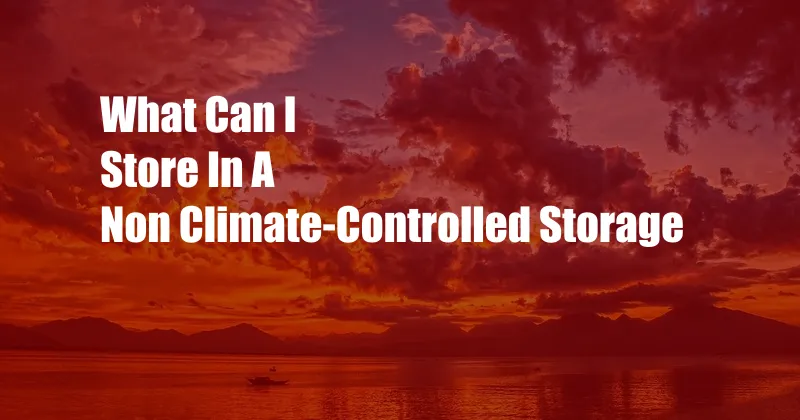
What Can I Store in a Non Climate-Controlled Storage?
My heart sank as I looked around the living room. Boxes were stacked floor to ceiling, and furniture was crammed into every nook and cranny. I was desperate for more space, but I couldn’t afford a bigger apartment. In a moment of desperation, I turned to my friend, a seasoned storage expert.
“What can I possibly store in a non climate-controlled storage unit?” I asked.
Her eyes lit up as she launched into a detailed explanation of what items were suitable for storage in these facilities. Join me as I share her insights and delve into the fascinating world of non climate-controlled storage.
Non Climate-Controlled Storage: A Glimpse
Non climate-controlled storage units, unlike their climate-controlled counterparts, do not regulate temperature or humidity. These units generally provide a more affordable storage option since they lack the advanced equipment necessary for climate control.
However, it is crucial to note that the lack of temperature and humidity control limits the range of items that can be safely stored in these units. Extreme heat or cold, as well as fluctuations in humidity, can damage or deteriorate certain items over time.
A Comprehensive Overview of Suitable Items
Understanding the nature of non climate-controlled storage units is key to determining what items can be safely stored within them. While some items thrive in these environments, others should be carefully considered or avoided altogether.
Items Suitable for Non Climate-Controlled Storage:
- Household Items: Non-perishable items such as plastic storage bins, furniture, appliances, and clothing can be safely stored in these units.
- Sporting Equipment: Non-electronic equipment like golf clubs, tennis rackets, and bicycles can withstand varying temperatures and humidity.
- Seasonal Decorations: Items like holiday decorations or seasonal clothing can be stored without concern.
- Personal Documents: As long as they are properly sealed in waterproof containers, important documents can be stored safely.
- Non-Perishable Food: Canned goods, packaged snacks, and non-refrigerated beverages can be kept in these units.
Items Unsuitable for Non Climate-Controlled Storage:
- Perishable Items: Food, plants, and perishable items will deteriorate quickly in these units due to temperature fluctuations.
- Electronics: Extreme heat or cold can damage electronic devices, rendering them unusable.
- Artwork: Paintings, photographs, and valuable collectibles are susceptible to damage from temperature and humidity changes.
- Musical Instruments: Wooden instruments, in particular, can be affected by humidity and temperature variations, warping or cracking.
- Organic Materials: Leather, wool, and silk can deteriorate due to moisture and temperature changes.
Tips and Expert Advice from the Trenches
Navigating the world of non climate-controlled storage can be daunting, but with the right knowledge and precautions, you can ensure your belongings remain safe and sound.
Essential Tips:
- Use Sturdy Containers: Invest in durable plastic bins or cardboard boxes to protect your belongings from dust and moisture.
- Pack Wisely: Fill boxes to capacity to prevent shifting during transport and storage.
- Cover Furniture: Protect your furniture from dust and scratches by covering it with plastic wrap or blankets.
- Consider Silica Gel Packets: These packets absorb moisture, helping to minimize damage to items susceptible to humidity.
Insider Insights from Forums and Social Media:
By scouring online forums and social media platforms, I have uncovered valuable insights from seasoned storage veterans. Here are a few gems:
- Use Vacuum-Sealed Bags: Vacuum-sealing clothing and other items can significantly reduce moisture exposure and protect against pests.
- Avoid Storing Valuables: Sentimental or irreplaceable items should not be stored in non climate-controlled units.
- Check Units Regularly: Inspect your storage unit periodically to ensure there are no signs of moisture or pests.
Frequently Asked Questions: Unraveling the Mysteries
Q: Can I store books in a non climate-controlled storage unit?
A: Yes, but only if they are properly sealed in moisture-proof containers.
Q: Can I store tires in a non climate-controlled storage unit?
A: Yes, but be sure to inflate them to the manufacturer’s recommended pressure to prevent damage.
Q: Can I store a car in a non climate-controlled storage unit?
A: Yes, but it is recommended to take precautions such as disconnecting the battery, adding fuel stabilizer, and covering the vehicle.
Conclusion: Embark on Your Storage Journey with Confidence
Understanding what can be safely stored in a non climate-controlled storage unit empowers you to maximize space and protect your belongings. By following the insights and tips outlined in this article, you can confidently navigate the storage landscape, ensuring your items remain safe and sound.
If you are interested in storage solutions, be sure to explore other resources and consult with storage professionals to find the best option for your specific needs. Happy storing!